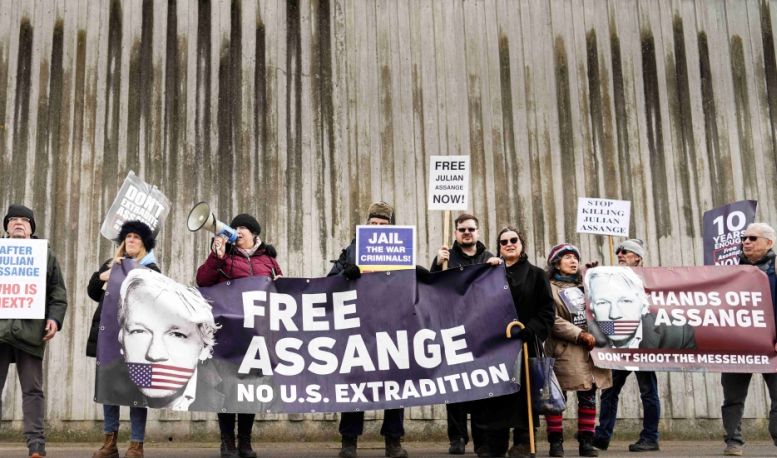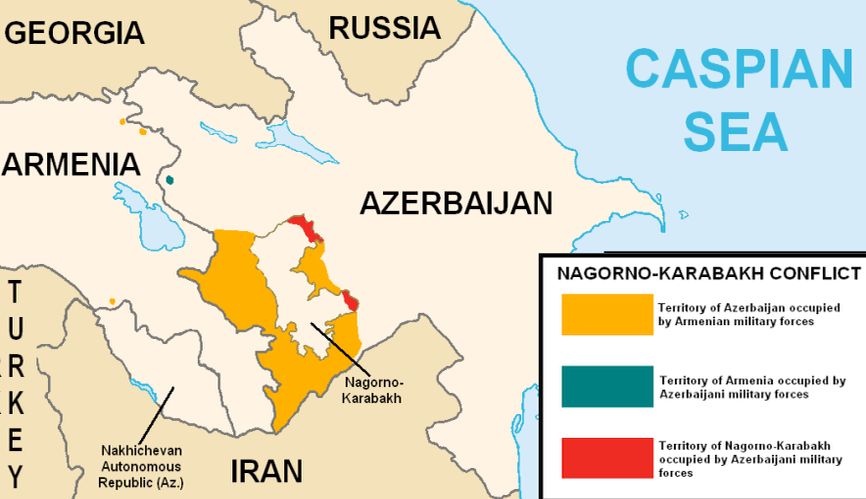But His Persecution Proves That No One Is Truly Free
Wikileaks founder Julian Assange has been released from prison and allowed to go home to his wife and children in Australia after pleading guilty to conspiracy to commit espionage.
His sudden release ends a legal nightmare for Assange during which he was involuntarily confined for fourteen years – whether under house arrest, trapped in a small Ecuadorian embassy, or incarcerated in a maximum-security prison often called the “British Guantanamo”– while he fought extradition to the US where he faced eighteen counts and a maximum sentence of 175 years in prison.
During his time in prison Assange was treated like a violent offender (for example being forced to observe his extradition trial from a glass cage), and was subjected to conditions that amounted to torture according to a UN Special Rapporteur (including solitary confinement). His crime? Exposing the lies and war crimes of US imperialism.
The British Government even spied on his legal team, and the CIA conspired to abduct or even assassinate him.
Now, after all that, the US has contented itself with handing Assange a mere 62 month-sentence – not coincidentally the exact amount of time he had already been incarcerated – for just one count, and allowing him to walk.
He has even been granted immunity from prosecution for any and all past “crimes.” This covers publication of the classified materials that he was being prosecuted for – namely, the massive cache of US diplomatic cables collectively known as “Cablegate,” the Guantanamo files; and the Afghan and Iraq War Files, including the infamous “Collateral Murder” video, which depicts the killing of a dozen unarmed Iraqis (including two Reuters journalists) by the gleeful aircrew of a US Apache attack helicopter. But it also covers all other published materials as well, including the Syria files and the 2016 US Democratic Party National Convention emails, which Assange was not being prosecuted for.
The US government also finally admitted that no known harm befell anyone as a result of these publications, after long maintaining that they had endangered its agents.
What accounts for this sudden, happy turn of events? According to close observers of the case the answer to this question is twofold. Most immediately his release is due to the High Court in London granting Assange an appeal request to argue that his status as a non-US citizen would have prejudiced him at trial in America – something that rules out extradition under UK law. This decision greatly increased the likelihood that the US was going to lose the extradition case, making them much more amenable to negotiating a deal.
But perhaps just as important was the quiet diplomatic pressure that the Australian government – a key US ally in the New Cold War with China – had been applying to the US for Assange’s release in recent years: pressure that is actually a result of the unrelenting grassroots pressure that the Australian working class was applying to their government. It is largely due to their efforts, and those of working people the world over, that Assange has finally been released and his extradition – which posed grave danger to press freedom – has been averted.
Thus, this is a huge victory by and for working people everywhere.
Assessing the damage to press freedom
Assange’s extradition to face charges of violating the draconian World War One-era Espionage Act – which are by design almost impossible to defend against – would have set a horrifying legal precedent that paved the way for other journalists to follow, regardless of where in the world they live (Assange has barely ever set foot in the US).
This is because, despite the insistence of the capitalist ruling class and their cronies in the mainstream media that Assange is not a journalist, in reality it is impossible to make this distinction in good faith. Even the Obama administration – which hated Assange and loved using the Espionage Act – admitted that they could not charge Assange with espionage without de facto criminalizing any journalist who publishes anything the US government deems secret.
Tellingly, Justice Department officials at the time referred to this as the “New York Times problem.” It is because of this “problem” that Assange was not charged with espionage until Trump became President, who attempted to circumvent it by alleging that Assange had actually engaged in hacking, which is not normal journalistic practice. This, the Trump administration argued, meant that he could be charged without endangering press freedom.
But Amnesty International, Human Rights Watch, Reporters Without Borders, the ACLU, and many other similar groups did not buy this argument, correctly surmising that in reality Trump simply did not care for press freedom. After all, the press, in his words, is “the enemy of the people.”
(A sentiment the Biden administration evidently shares, since, to its discredit, it decided to see the prosecution of Assange through once it came to power.)
Fortunately, the plea deal Assange agreed to last month has averted the worst, since plea deals have no impact on legal precedent. Unfortunately, however, this does not mean that press freedom has emerged from this ordeal unscathed – far from it.
For one thing, this is because the plea deal does not even reference the Trump administration’s hacking allegation. Not only does this corroborate the suspicion that this charge was (if you will forgive the pun) Trumped-up, but it also means that, in effect, Assange pleaded guilty to doing journalism. And that sends a message that journalists everywhere ignore at their peril, and which judges and other state authorities can take cues from.
For another thing, the prosecution – really the persecution – of Assange has itself set a dangerous political precedent. Even though he was not successfully extradited to stand trial in the US, his treatment at the hands of US-allied authorities has nonetheless demonstrated that journalists and publishers who disclose American secrets could find themselves ensnared in a protracted legal nightmare like the one Assange just escaped.
At the very least, Assange’s case is therefore likely to have a chilling effect on journalists and publishers around the world, who are now more likely to think twice before they publish US or other state secrets, even if doing so is clearly in the public’s interest.
This means that, although Assange’s release is absolutely worth celebrating, his persecution may well have achieved its true objectives, which never necessarily required imprisoning him in the US. (In fact, it is reasonable to doubt that the US actually wanted to see him in an American courtroom at all, given the potential of such a spectacle to further expose the hypocrisy of the self-proclaimed “democratic” state and the lip service it pays to press freedom – not to mention the alienating effect it could have on voters heading into what is already shaping up to be a difficult election for Biden.) These objectives were (a) to silence Assange, which has been at least temporarily accomplished (Wikileaks hasn’t published new material since 2021), and (b) to make an example of him that would discourage others from exposing US war crimes and other embarrassing secrets.
In other words, the threat Assange’s persecution posed to press freedom was no accident – it was actually the whole point of the operation. And althoughhis release is a win for press freedom, it is therefore nonetheless also true that the shameful attack on press freedom that his persecution represented can be considered a success.
No one is free until everyone is free
With his release it has been widely reported that Assange is now “free.” But his brutal persecution underscores something that socialists have long known: that no one is truly free in a world dominated by capitalist imperialism. Any illusions to the contrary are quickly shattered when serious challenges are mounted to the exploitation and lies upon which this system is premised.
But this observation does not only highlight our depressing collective imprisonment, it also points to the uplifting fact that our capitalist jailers, like vampires, depend on darkness and are highly vulnerable to the light of day. In a capitalist world, to quote the German socialist Ferdinand Lassalle, “to tell the truth is revolutionary.”
Trotsky knew this too. Thus, one of his first acts as Commissar for Foreign Affairs for the new Soviet government was to publish in the newspaper Pravda the secret Sykes-Picot treaty, in which imperialist Britain and France (with Czarist Russia’s assent) agreed to dismember the Ottoman Empire, seize it, and to divide it between themselves, utterly disregarding the will of the region’s inhabitants, and in direct contradiction to the independence the British were promising to their Arab allies. Many of the modern Middle East’s problems can be traced back to this nefarious pact (including the ongoing genocidal war in Gaza), and in publishing it Trotsky exposed for all to see the utter mendacity and moral bankruptcy of the imperialist powers, greatly embarrassing them and profoundly affecting public opinion at the time.
While Assange is not a socialist, and while his stated aim is “reform,” not necessarily revolution, the effect of his publications have been comparable. Together with whistle-blower Chelsea Manning, who provided him with many if not all of the materials he was being prosecuted for publishing (and who, shamefully, is still barred from entering Canada as a result), Assange pulled back the curtain on US imperialism, in the process exploding the disingenuously optimistic and sanitized mainstream narrative regarding US War On Terror.
But even this is not the extent of his journalistic accomplishments, whose sheer quantity precludes a full recounting. As just two additional examples among many: he also helped reveal that the US was knowingly provoking Russia into invading Ukraine, and that the Democratic Party secretly conspired against the 2016 Bernie Sanders presidential campaign.
Disclosures like these help open many eyes to the depravity of capitalism and imperialism and, as such, they are laudable revolutionary acts, regardless of the personal politics or failings of the publisher. The fact that Assange was brutally punished for them is even more revealing as a clear demonstration of the hypocrisy and vindictiveness of the capitalist ruling class.
(That is not to say that his accomplishments and persecution negate his failings. For example, in 2010 Assange was accused of sexual assault and rape by two Swedish women – charges that Socialist Alternative has always maintained he should answer to although they have since been dropped.)
But seeing the world for what it is and changing it are two different things. Thus, while journalism is, at its best, an essential component of democracy, and while democracy is, in turn, incompatible with capitalism, journalism is also, by itself, unequal to the task of setting humanity free, no matter how revelatory it is. The only force that can accomplish that is an international mass movement, based on the principle of democratic centralism, and dedicated to building a socialist society – a goal that Socialist Alternative is actively working for.
This is the only way to truly free Assange, along with everyone else on the planet. And it is the only way to build a world in which telling the truth is no longer revolutionary, but standard practice.




